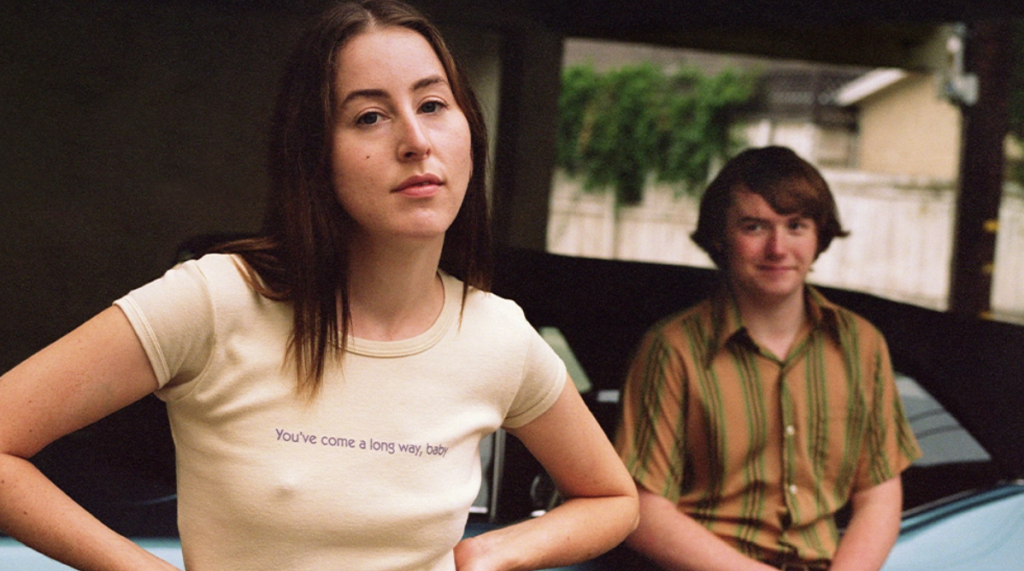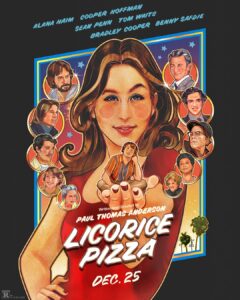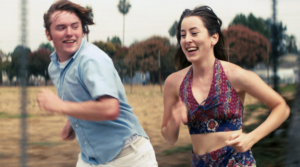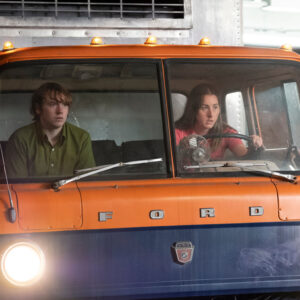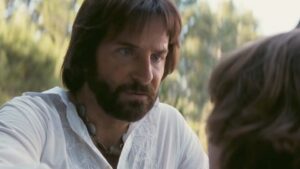Written and Directed by Paul Thomas Anderson | 133 min | On Demand
It’s an interesting choice by the renowned American filmmaker Paul Thomas Anderson, now in his 50s, to look backward.
Not just make a film set in the early ’70s, when he would’ve been a baby, and where he grew up — the San Fernando Valley, a Los Angeles suburb — but also where some of his early films were set; Boogie Nights and Magnolia.
You could spend all of Licorice Pizza listening for those echoes to Anderson’s earlier work, or searching for the easter eggs, parsing the real stories and characters who inspire the events in the film. That’s all just the topping on a meal that’s plenty delicious all on its own.
Licorice Pizza is absent the edge or attention-grabbing stylistic quirks of some of that early (or even more recent) work, but it’s undeniably a Paul Thomas Anderson film — see the familiar mismatched relationship, rife with tension and awkward affection, that drove the leads in Punch Drunk Love or Phantom Thread. It might also be fair to say this is Anderson’s effort to reach the kind of truth Richard Linklater brings to many of his films, inspired by actual events, which always ends up saying something about the American experience.
Anderson cast two first-timers who carry the whole project. They make it work so well because they’re not the perfect physical specimens Hollywood would usually choose. Their inexperience is to their credit.
Alana Kane is played by Alana Haim, of the California rock act, Haim. She’s 25 (or maybe 28), a bit adrift in her life. She lives at home with her parents (played by her actual parents, Moti and Donna Haim) and two sisters (her actual sisters, Este and Danielle). She’s prone to anger and is probably less mature than her years.
Gary Valentine is played by Cooper Hoffman, son of frequent Anderson collaborator Philip Seymour Hoffman who died in 2014. Gary is 15 and a child actor in Hollywood, going out on auditions on the regular, but he’s also an entrepreneur. “Hustler,” is probably a more accurate label. He’s certainly more mature than you’d expect from a 15-year-old: he’s friends with adults and opening businesses where he sees opportunity.
Alana and Gary meet at Gary’s school, where he asks her out. She agrees, but makes the ground rules clear: They won’t be dating because he’s too young, and that would be illegal. And gross. But it’s clear they like each other.
What follows is what feels like an anecdotal telling of their friendship — his efforts to get close to her, his disappointment when she ends up dating another young, more successful actor, Lance (Skyler Gisondo from Booksmart). She’s quietly awed by Gary’s confidence, street smarts, and Hollywood connections. They go into a waterbed business together, and we see her disappointment when he takes an interest in a girl his own age. And so on, this push and pull of two people both looking for love but having it not work out for a whole bunch of reasons.
But, it’s hard to tell how much time is passing as we travel through the story. At first I thought we were passing through years, and maybe a new level of their relationship would be reached when Gary turned 18, but the film could actually transpire over a single summer. There’s no way these two are going to end up together in the long run, but their chemistry is palpable.
The proximity to decaying Hollywood brings a certain low-rent sleaze to the proceedings. Sean Penn appears as a William Holden-type star looking to cast Alana in his new movie, but when they cross paths with Rex Blau (Tom Waits), a gone-to-seed director, it devolves into a motorcycle stunt reenacted on a golf course for patrons of a popular Valley bar, Tail O’ The Cock.
We also get Bradley Cooper as an actual Hollywood legend of sorts, Jon Peters, the manic hairdresser turned producer who in the ’70s dated Barbara Streisand, and the story of a terrifying-yet-amazing delivery of a waterbed to his Hollywood Hills home during a gas shortage.
Benny Safdie appears as a municipal political candidate who Alana volunteers for, where she discovers what lengths he’ll go to hide his real self at a time of bigotry.
Licorice Pizza has also things to say about the casual racism and sexism of the era, though one particular joke is especially poorly executed — I’d recommend checking out Rad Simonpillai’s thoughts on that. It’s a running gag likely there to illustrate the kinds of awful things people said at the time toward Asians — and still say — but it just doesn’t work as a joke or as criticism of the same.
I’ve also read concerns that the film glamorizes pedophilia, given the age differences of the leads. That perspective is a little harder to understand. At its heart, the picture is a shaggy, hang-out rom-com about impossible, see-sawing attraction that happens to people of all ages, but especially when you’re young. It’s not glamorous, it’s painful and difficult and awkward, and even if you find a moment of grace and beauty therein, it never lasts. The film recognizes that fleeting sensation and pointedly has the leads mismatched intentions right through the final moments.
Even with a couple ill-advised moments Licorice Pizza is a joy, and contains my favourite performance of the year: Alana Haim should be an instant movie star thanks to this — she’s spectacular in the role.
It occurred to me a few times as I watched it that the film’s wash of good feeling is what Quentin Tarantino was trying to do with his overrated Once Upon A Time In Hollywood, but Anderson achieves effortlessly here. I’m not the first to remark on this, but Anderson’s films are not to be watched but to be experienced. This is easily one of his strongest — and certainly most crowd-pleasing — experiences.





